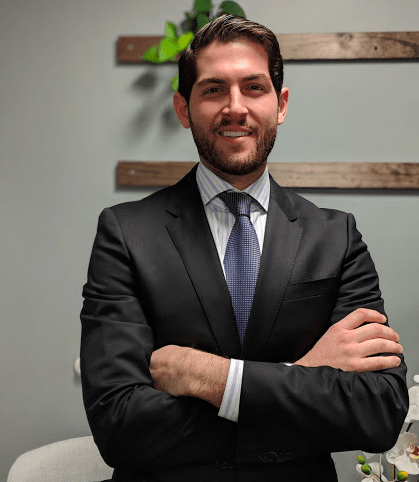Are you a physician who loves educating your patients, yet you want to share your knowledge in a much broader way than one patient at a time?
Perhaps you want to start a YouTube Channel, offer a health coaching program, or create an online course.
You’re the expert. But how do you share your medical knowledge online and not get into legal trouble?

In today’s interview, Chase Howard, Esq., a health law and business attorney with Florida Healthcare Law, shares some advice for physicians offering medical information outside of the traditional doctor-patient relationship.
Without further ado, let’s get on with the interview!
Q: How did you become interested in being a health law attorney?
I grew up in a family where my dad was a physician, my mom was a nurse, and 4 uncles were physicians. My stepfamily included an oral surgeon and a physician. Both of my brothers and my brother-in-law became physicians as well. I spent summers “working” at my dad’s private practice before I was old enough to actually contribute and learn more about the business of medicine.
On top of that, I spent a lot of my younger years being monitored and treated for a heart condition. I saw behind the scenes and what it took for physicians to get to where they are. I always thought about how they’re constantly caring for others but have no one to care for them. When I started law school, I just kind of thought, “Okay, I want to be a lawyer for doctors, “but had no idea what that meant until I sought mentors in the field and explored options for helping physicians in the area of health law.
Q: What are the typical kinds of issues you help physicians with?
Some typical matters I help with include: Employment contract reviews, employment document drafting, practice start-up, lease or property purchase review, vendor contracts, trademarks, independent contractor agreements, corporate issues (start-up, organization, partnerships), purchase or sale of a practice, adding additional services to a practice, federal and state regulatory compliance (anti-kickback, stark, patient brokering, fee-splitting, etc.).
My goal is to help doctors legally and safely start practice, avoid significant legal pitfalls, and maximize their ability to just focus on practicing.
Q: A number of physicians want to do health coaching but not be the patient’s physician. What do physicians need to consider before taking on this role as a health coach?
Physicians, like lawyers, have to be very careful about sharing any information with a person. Without intention, they can create a patient-physician relationship and the patient will rely on that. Here’s what I’d keep in mind:
1. Make a clear distinction between your primary practice (or employment) and coaching;
2. Make sure your clients acknowledge that they understand that you are not their physician and they can’t rely on you for that; and
3. Disclose to your current patients that you own the coaching business to avoid what is commonly referred to as “White Coat Marketing”.
Q: Could you define “White Coat Marketing” and how physicians would disclose having a coaching business to their patients?
White Coat Marketing refers to healthcare professionals advertising or marketing other businesses (typically, products or devices, but also other service-oriented businesses). It’s not necessarily unlawful or illegal, but there can be disclosure issues if a physician is practicing traditionally in one area and selling services unrelated to the traditional practice on the side.
The best way to disclose the coaching business would be on a membership or intake form to include a disclaimer/notice of shared ownership but separate functions.
Q: What are the most common mistakes physicians make when starting a health coaching business or being a physician YouTuber?
Unintentionally creating a patient-physician relationship, failing to disclose ownership, and specifically giving advice rather than just sharing information.
Q: Do you have a rough estimate of the legal fees involved when a physician wants to establish some type of online business offering medical content?
While each situation is different, fees could range from $2,000 to well over $6,000. This would include educational meetings on the laws, options, and risks, corporate start-up, appropriate forms and documents for patients, and even website compliance.
Q: Are there certain things that every physician who’s setting up a health coaching or related business should make sure to have to be legally protected?
From a business liability standpoint, you want to make sure your personal and business assets are separate from your coaching practice. Most of the documents and disclosures discussed above are key.
Q: How common is it for physicians to get into legal trouble if they are giving medical information to the public over the internet?
I think any time professionals put themselves into the public sphere, there is some risk. This doesn’t scream legal issues, however, but you still have to be careful. Avoid making promises or answering direct questions about patients. Sharing information is hugely important in medicine, but always remember that people may rely on what you say and if they don’t have a desirable outcome, they might look to you for retribution.
Q: Legal consent forms can be pretty off-putting to those who have to sign them. It can feel as if they’re signing all their rights away. How does a physician avoid scaring people off with all of the legalese in consent forms, but still stay protected?
Our job as attorneys is to present the physician with the laws, options, and risks. The physician will guide us from there on how “intense” they want the document to be. In most cases, we can create a document that provides the most information as possible in a “non-scary” manner, then have a simple release/consent clause. I think this is a good balance that still accomplishes the goal of informing the patient of everything that might happen, but not make it seem as if they’re signing their life away.
Q: If physicians want to create and sell a digital online course about a medical condition, for example, diabetes, what do they need to do to avoid getting into trouble?
The primary thing is to make sure you’re not giving advice in response to a specific client or patient, as well as not making any unfounded claims regarding treatment or cures.
Q: What kinds of legal problems have you seen doctors getting into in this space of health coaching and offering medical information over the internet?
The worst I’ve seen is where a physician doesn’t ensure that clients understand that no relationship is established. Then a patient goes and relies on that advice and there is an adverse reaction. Usually, that kicks off a malpractice inquiry. The other is with privacy (protecting health information) and usage of information (Terms of use on a website).
Q: Is there one approach that is less risky than others? For example, 1:1 health coaching vs a digital course, vs a YouTube Channel, or a membership site?
1:1 coaching could carry the most risk as patients might mistakenly believe that the coach is their physician giving medical advice. The best way to ensure the relationship is clear would be through proper documentation and disclosure, while also giving information in a structured way rather than offering specific advice. Digital courses, YouTube, and memberships where pre-recorded information is available is less risky, as the patient can’t reasonably expect that they’re being “treated” by their physician
Q: If a doctor is providing information over a YouTube channel, obviously he or she is not going to get written consent from all of the viewers. Is it sufficient to have some type of disclaimer on the site?
I would suggest that each video have disclaimers before the information starts, and maybe even again at the end and on the channel/website.
Q. Does a physician who wants to share medical content via YouTube or other social media platforms need to be in active practice?
You definitely don’t need to be actively practicing, but ideally your license is still active and up-to-date. Sharing information is certainly legal and good, and I think the same applies to not crossing the line into giving direct care and advice.
Q: Can physicians who are outside of Florida work with you? If not, how do you recommend they find a reputable healthcare attorney?
Yes and no – As attorneys, we’re licensed in each state where we take and pass the Bar exam. I’m only licensed in Florida (for now, with DC, NY, and NC on the horizon). We do have another attorney here licensed in NY. For state law-specific issues, we’re limited to Florida. For federal issues, we can work with clients anywhere. We do have clients all over the country and when we have clients that have state-specific questions, we can either find local counsel to sign off on our work, or add what we need to their work.
Q: What is the best way for physicians to reach you if they’d like to learn more about your services? The most direct way is to email me: Chase@FloridaHealthcareLawFirm.com. I’ll get them set up for a free consultation call from there.
They can call our office as well to schedule a call at (561) 455-7700.
They can also follow us on Instagram and LinkedIn, as well as our blog on our website, for free articles, video posts, webinars, and updates. We have 10 attorneys putting out content a few times per month, so if there is anything they’re interested in, let us know and we’ll either write about it or host a webinar.
Note to readers: Do your due diligence when seeking legal counsel to ascertain if the attorney has the expertise and experience you need for your situation and have costs outlined in advance.
Lastly, don’t underestimate your ability to scale what you teach patients every day. You can harness the power of video and the internet to get creative in how you share your knowledge and unique teaching style. The sky really is the limit.
Latest Posts
Find what you're looking for:
Popular Categories:
Career Change | Career Enhancement | Job Search | Personal Development
4 Comments
Leave a Comment























This is excellent information. I’ll share it with the docs I know! They need this.
Thank you very much Lisa Tener! I appreciate the help you’ve given my physician clients with their writing projects and aspirations!
As always excellent resource that offers a whole lot of clarity regarding the do’s and don’ts without scaring us back into our regular cubby holes. Thanks again Heather
Thank you kindly Dr. Eno!! I’m glad you found the interview helpful. I so appreciate your taking the time to read and comment! All the best to you.